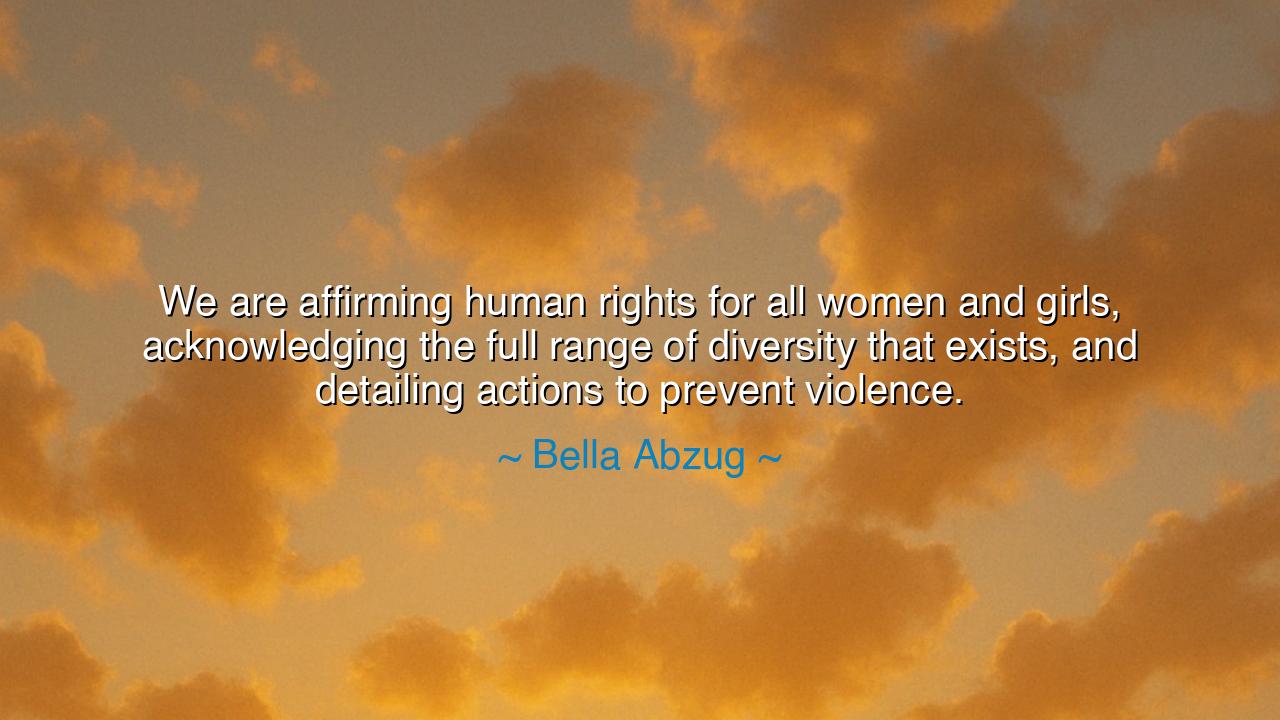
We are affirming human rights for all women and girls
We are affirming human rights for all women and girls, acknowledging the full range of diversity that exists, and detailing actions to prevent violence.






The words of Bella Abzug — “We are affirming human rights for all women and girls, acknowledging the full range of diversity that exists, and detailing actions to prevent violence.” — rise like a declaration carved into stone. She speaks not of lofty dreams alone, but of the sacred duty to make human rights real and tangible, especially for women and girls who have too often been denied them. Her voice is both a shield and a trumpet: a shield against the violence that wounds, and a trumpet to call the world toward justice.
The meaning of her words is threefold. First, to affirm human rights is to proclaim them universal, not a privilege to be granted by rulers, but a birthright belonging to every woman and girl. Second, she insists on recognizing diversity, refusing to allow the struggles of some to eclipse the struggles of others — women of every race, class, culture, and identity must be seen. Third, she demands action, for words without deeds are hollow, and justice delayed is justice denied.
History bears witness to the truth of her vision. Recall the Fourth World Conference on Women in Beijing, 1995, where leaders and activists from across the globe gathered to declare that “women’s rights are human rights.” That summit, echoing the spirit of Abzug’s lifelong work, was not only a council of words but a call to concrete steps: to fight violence, to expand education, to uplift health, and to secure equality. It was a moment where the struggles of countless women found a voice before the nations of the earth.
The origin of Abzug’s words lies in her unyielding career as lawyer, activist, and congresswoman — a woman who carried the fire of justice into every hall she entered. She knew the cost of silence and the danger of compromise when lives were at stake. By affirming rights and demanding prevention of violence, she gave shape to a vision where women were no longer treated as vulnerable subjects but as rightful heirs to dignity, safety, and power.
Therefore, O children of tomorrow, let this teaching be a guide: equality is not a gift but a claim, not a dream but a demand. To affirm human rights for all women and girls is to strengthen the very foundations of humanity itself. As Bella Abzug reminds us, the measure of a civilization is not in its monuments or armies, but in how it guards its most vulnerable. Let your generation carry forward her charge: to protect, to honor, and to build a world where every woman walks free from fear, and every girl is given the chance to rise.






TNtrang nguyen
This quote from Bella Abzug really speaks to the core of the fight for women’s rights—affirming rights for all women, addressing violence, and honoring diversity. But are we doing enough to challenge deeply ingrained societal norms that perpetuate violence against women? How do we shift not just policies, but societal attitudes, to create real and lasting change? The call to action is clear, but what will be the hardest barriers to overcome in making this vision a reality?
TThinh
Abzug’s focus on preventing violence and ensuring the recognition of diversity in women’s rights is powerful, but it raises the question: what does ‘diversity’ really mean in this context? Are we truly considering the most marginalized women, such as those in conflict zones, or those without access to resources and protection? It’s important to have broad goals, but how do we ensure that they translate into concrete, effective policies that reach the most vulnerable?
TT34. Hoang Thu Tra
I appreciate Bella Abzug’s call to affirm human rights for all women and girls, but I wonder how we can actually ensure that this diversity is recognized in practice. What steps are being taken to make sure that women from all walks of life are included in these conversations, and that their voices are heard? How do we move from affirmation to action in addressing the root causes of violence and inequality that many women still face today?
UGUser Google
Abzug’s statement highlights a critical issue: the importance of recognizing diversity in the fight for women’s rights. How often do we consider the unique struggles of women from different cultural, racial, or socioeconomic backgrounds? It’s empowering to hear about actions being detailed to prevent violence, but how can we make sure that these efforts are sustained and that they actually lead to real, tangible change in the lives of women and girls everywhere?
HHNguyen Lam Huy Hung
Bella Abzug’s quote emphasizes the importance of acknowledging the full range of diversity when it comes to human rights for women and girls. This inclusivity is crucial, but are we truly addressing the needs of all women, especially those who may be marginalized within the broader movement? How do we ensure that actions to prevent violence are tailored to the unique experiences of diverse women, rather than applying a one-size-fits-all approach?